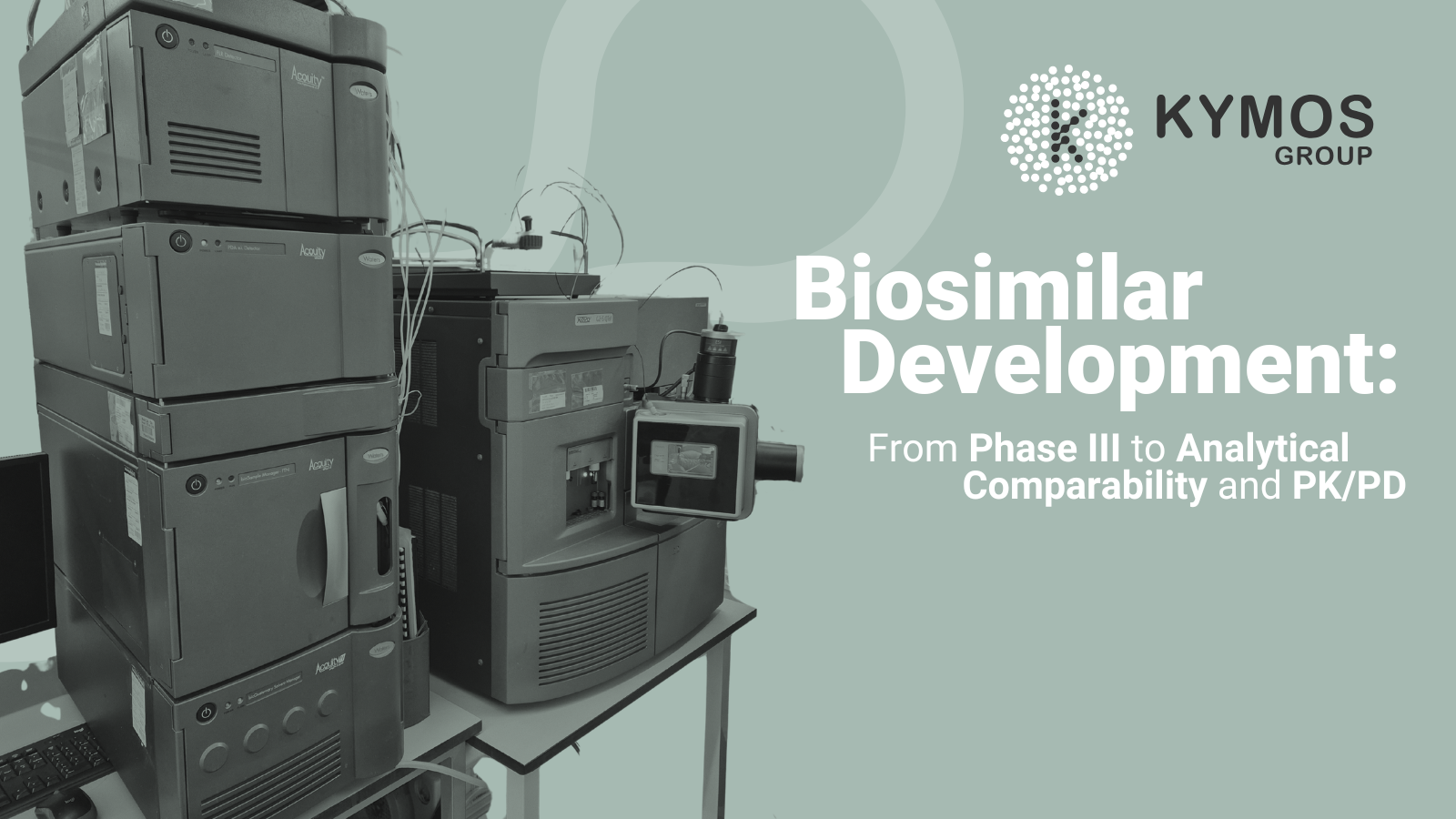
Although the development of biosimilars has historically been difficult, expensive, and time-consuming, they are the solution to improving patient access to life-saving biologic therapies. Traditionally, confirmatory Phase III comparative efficacy and safety (CES) studies were considered a standard requirement for approval, but this has recently changed.
In 2025, both the U.S. Food and Drug Administration (FDA) and the European Medicines Agency (EMA) published major updates confirming that, in most cases, confirmatory Phase III trials will no longer be required. Instead, robust analytical comparability data, supported by pharmacokinetic (PK) and, where relevant, pharmacodynamic (PD) studies, will be the required standard for biosimilar submissions.
Key Takeaways
- EMA and FDA no longer require costly Phase III efficacy trials for most biosimilars.
- Analytical comparability, PK/PD studies, and immunogenicity testing are now the core of biosimilar development
- Global regulators are aligning to facilitate patient access and accelerate biosimilar development.
- This creates opportunities for developers to reduce costs and timelines, but demand robust analytics and smart and faster development planning.
In this article, we recap what these regulatory changes mean for biosimilar developers, why analytical comparability and PK/PD studies are now the focus, and how Kymos Group can help companies navigate this new development path.
The Regulatory Change: EMA and FDA Alignment
According to the EMA’s draft Reflection Paper on a Tailored Clinical Approach in Biosimilar Development, demonstrating high similarity in structure, function, and pharmacokinetics (PK) through exhaustive studies allows for the inference of clinical efficacy. Therefore, comparability data for structure, function, and PK are the main requirements for biosimilar approval. Comparative clinical efficacy studies (CES) are necessary only when the compound’s mechanism of action is poorly understood, or when identified structural and functional differences may affect clinical outcomes.
Similarly, the FDA recently accepted its first-ever application to waive clinical efficacy studies for monoclonal antibody biosimilars. This occurred in parallel with the publication of the FDA’s guidance on Comparative Analytical Assessment and Other Quality-Related Considerations, which provides an exhaustive and detailed description of the analytical requirements to demonstrate seamless comparability between a biosimilar and its reference product
In practice, this means that CES studies are no longer the default requirement. Instead, agencies now expect developers to rely on a “totality of evidence” approach coming from analytical data, functional assays, PK/PD studies, and immunogenicity testing to establish biosimilarity. Besides EMA and FDA, other regulators, such as WHO or Health Canada, are also revising their guidelines to reduce unnecessary clinical trials, thus creating a harmonized global framework.
From Phase III to Analytics and PK/PD
Why Phase III Studies Are Being Reconsidered
Large CES studies have historically been time and resource-intensive, requiring hundreds of patients, costly comparator sourcing, and long follow-up periods. Yet regulatory experience shows that products meeting biosimilarity standards rarely reveal clinically meaningful differences in Phase III.
For this reason, the new standard for biosimilar development is formed by:
Analytical Comparability
Comprehensive physicochemical and functional characterization is the foundation. Developers must:
- Assess primary to quaternary structure, post-translational modifications, and product-related variants.
- Use orthogonal, state-of-the-art analytical methods.
- Test multiple lots of both the reference product and biosimilar to understand variability.
- Apply a risk-based approach to identify critical quality attributes (CQAs) and link them to clinical performance.
PK and PD Studies
Human PK studies remain essential, often designed as single-dose crossover studies to compare absorption and elimination between biosimilar and reference product. PD endpoints may be used if a validated surrogate marker is available. Immunogenicity data are typically collected alongside PK.
Immunogenicity Assessment
Binding and neutralizing anti-drug antibodies (ADAs, NAbs) must be measured to rule out immune responses that could impact efficacy or safety. The current guidelines recommend a tiered approach: screening for binding antibodies, confirmatory testing, and characterization of neutralizing activity when required.
Together, these three parts provide the “totality of evidence” needed to demonstrate biosimilarity without the need for large efficacy trials.
What This Means for Biosimilar Developers
This regulatory change opens new doors and presents opportunities for biosimilar developers, but also raises expectations in certain areas. On one hand, the shift away from mandatory Phase III trials will accelerate developments and broaden participation in the biosimilar market. On the other hand, it creates higher analytical expectations, careful planning, and close alignment with regulatory agencies.
Opportunities
- Lower costs and faster timelines: Eliminating Phase III studies can reduce development by several years.
- Greater market participation: Smaller and mid-sized biopharmaceutical companies can now compete in the biosimilars space.
- Regulatory clarity: Harmonization of global guidelines allows for a more predictable development path.
- Real-world precedents: Several recent biosimilars have already been approved without Phase III trials, showing that streamlined pathways are not just theoretical but already being implemented by regulators.
New Demands
- Higher analytical standards: Sensitive, orthogonal methods and comprehensive risk assessments are mandatory.
- Early planning: A pre-agreed similarity assessment protocol is recommended before starting pivotal studies.
- Robust manufacturing controls: Consistency of commercial batches is crucial to support similarity claims.
- Regulatory engagement: Early scientific advice meetings with EMA or FDA are recommended to align on study designs and avoid surprises.
When Phase III May Still Be Needed
While the default expectation is now “no CES,” there are still situations where clinical efficacy trials may be requested. Phase III studies may still be required for products with unclear or complex mechanisms of action, or in cases where analytical data and functional assays are insufficiently predictive of clinical performance. Similarly, unexpected immunogenicity signals during PK studies could also require additional efficacy and safety data.
How Kymos Group Can Help
Kymos Group offers a full range of services to support biosimilar developers through this new regulatory situation:
- Analytical Comparability: Comprehensive CMC characterization, including physicochemical, functional, and potency assays under GMP. Learn more about our CMC analysis services
- Bioanalysis & PK Studies: GLP-compliant PK and immunogenicity testing (ADA, NAb) from our laboratories in Spain and Germany. Explore our immunogenicity testing capabilities
- Integrated Solutions: Partnerships with specialized clinical units allow us to deliver full PK/PD studies, combining clinical execution with in-house bioanalysis.
- Regulatory Expertise: Our teams design fit-for-purpose studies aligned with EMA, FDA, and ICH guidelines, ensuring your results are submission-ready.
Conclusions
The biosimilar market has been evolving rapidly in recent years, and this change marks a paradigm shift in their development. By reducing the importance of large Phase III trials, agencies are emphasizing a science-driven and efficiency-focused approach that focuses on robust analytics and smart development planning.
This new biosimilar environment presents opportunities for developers and highlights the importance of relying on trusted analytical partners such as Kymos. Our European laboratories offer end-to-end analytical comparability, bioanalysis, and PK/PD capabilities, meeting the required standards.
Together, these strengths position us to help biosimilar developers who need to meet new expectations and reduce their time-to-market while maintaining regulatory compliance.
Get in touch today to discuss how we can support your biosimilar program and help you leverage the latest regulatory updates.

